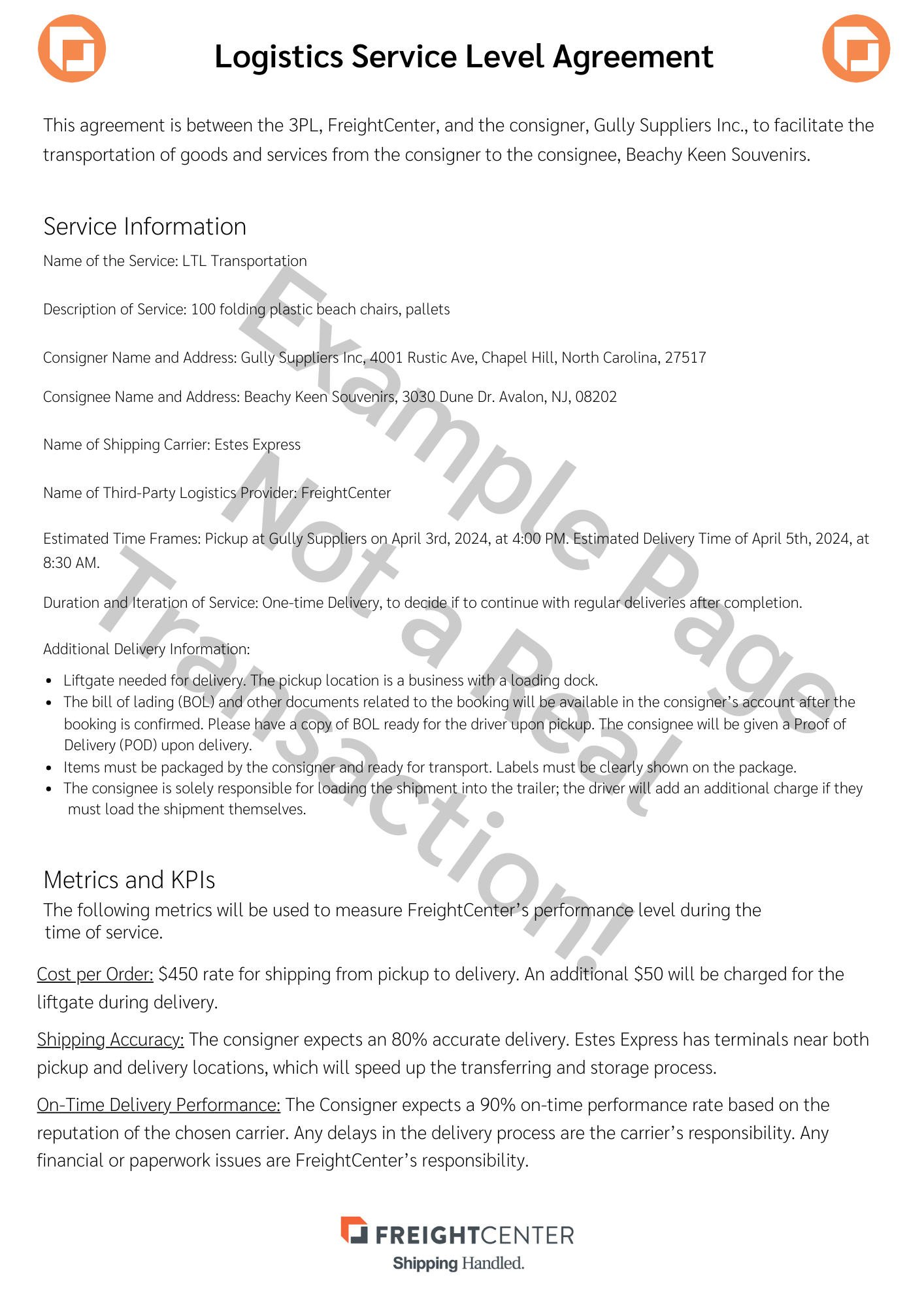
Logistics Service Level Agreement (SLA)
There are many kinds of paperwork involved in logistics. It makes sense, considering logistics is all about efficiency—having everything written down wastes less time addressing misunderstandings about poorly communicated logistical issues.
Third-party logistics (3PL) providers give out a lot of documents after a shipment is booked. One such document is a Logistics Service Level Agreement (SLA). This is a crucial piece of paperwork designed to facilitate communication and negotiation with a customer about the services the 3PL will perform and the level of quality expected.
Let’s explore SLAs and why customers and 3PLs should create one when booking a shipment.
What is an SLA?
An SLA is a contract between the customer and a logistics provider like a 3PL. The agreement outlines the services the provider is responsible for and the expected performance level during the duration of the services.
The provider must uphold all terms and conditions in the SLA; however, these measures are negotiated with the customer to be reasonable and attainable. The SLA also serves as a guide for both parties in case anything goes wrong or changes need to be made to the booking.

What’s Included in an SLA?
An SLA’s size can depend on what services the logistics provider agrees to and other factors like length of service and metrics. Some SLAs are only a few pages, while others can be the length of a novella!
An SLA can include details like:
- Name of the service
- Description of services
- Duration of services
- How many times service is done
- Expected time frame to complete service (delivery times)
- Metrics
- Communication information
- Security/Compliance clauses
- Penalties
- Termination clauses
The most prominent detail that an SLA includes is key performance indicators (KPIs). These are benchmarks that a customer can use to assess their logistics provider’s performance levels. KPIs can impact how customers feel about a 3PL’s service level and whether or not they will continue using a 3PL or switch to a different provider.
KPIs that can be used in an SLA include:
- Cost Per Order (CPO)
- On-time Performance
- Cost Reduction Agreements
- Transportation Utilization
- Quality Assurance Agreement
- Invoice Accuracy
- Picking/Inventory Accuracy
- Number of Damages Claims
- IT Integration Responsiveness/Accuracy
- Return Processing Time
- Voice of the Customer (VOC) forms

Why are SLAs Important to a 3PL?
Sets expectations: The customer and the 3PL express what they desire from this transaction while setting realistic boundaries preventing one side from exploiting the other.
Provides benchmarks: Both parties can agree on KPIs as benchmarks for future operations together while ensuring these benchmarks aren’t too tricky for the 3PL to meet.
Establishes backup plans: If something goes wrong during the contracted service, the customer can look to the SLA for guidance on who to contact and what steps to take. It also reminds 3PLS of the consequences for failing to uphold the SLA, usually in fines or reduced rates.
Guarantees accountability: The SLA ensures that a 3PL is accountable for a certain level of performance during service. At the same time, customers can use them to track whether 3PLs are becoming too complacent or working hard to assist the customer’s business growth.
Does FreightCenter Use SLAs?
Logistics service level agreements are crucial for building a strong relationship between customers and logistics providers. Both parties establish the rules, limitations, and consequences for the services provided by a 3PL. They can also refer to the SLA as an emergency guidebook if any issues arise during the service period.
FreightCenter aims to deliver top-quality service to our customers. That’s why we establish SLAs with our customers, outlining the expected level of service and using KPIs to measure our professionalism. They are one of the keys to engaging with our customers, aiding us in our company’s mission: to provide the best shipping experience.
Want to learn more about our shipping services? Call us at (800) 716-7608 or try our free online quote tool to get started with us today!


